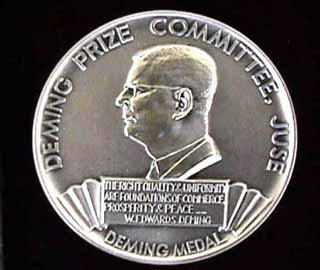 This article is about PBIS, using rewards to control, and how they contrast with W. Edwards Deming’s approach of collaboration being better than competition for improved learning, responsibility, and empowerment.
This article is about PBIS, using rewards to control, and how they contrast with W. Edwards Deming’s approach of collaboration being better than competition for improved learning, responsibility, and empowerment.
Chances are that you own a product manufactured by a Japanese company. Before WWII, Japanese products were referred to as cheap junk. Bur today you own a Japanese product because of its quality. The person who changed this was W.Edwards Deming, an American who was put in charge of reconstructing Japanese manufacturing after that war. The most prestigious Japanese award today is the Deming Prize. You can read about Deming’s approach in the Phi Delta Kappan cover article:
Dr. Deming described 14 Points for improving quality. He was firmly committed to cooperation and collaboration, by which he meant abolishing competition between workers. Unfortunately, many educators are still using competition between students in classrooms—as illustrated by my recent experience, related below.
I was recently in Las Vegas speaking at a conference on discipline. One of the exhibits was selling “PBIS Rewards.” The company developed a tracking system to give rewards to students who behave as the teachers desire. The system is transparent, so both the teacher and students view the recipients of the rewards (and how many)—and who do not receive rewards.
Obviously, the system has students competing for rewards—rather than collaborating for learning. The system gives those trinkets, stickers, or points that children want—children’s values, rather than values that promote character development for responsible living. The system requires that teachers only assign points; students cannot be involved, which of course, puts an extra burden on the teacher in rewarding, tracking, and record keeping.
In a conversation with one of the vendors of PBIS Rewards, the vendor insisted that there is no difference between what the system does and the reason that people work. I inquired if, when she gets her paycheck, her self-talk sounds like, “Thank you employer for rewarding me for my work.” There was no understanding that employment is a social contract: You give services and receive compensation. Employers do not bribe employees to work.
The program uses an outdated Skinnerian approach that only recognizes behavior and completely disregards motivation. In addition, rewarding young people for doing what they should be doing requires an outside person to dispense the rewards; yet, we want our children to grow up to be independent, responsible adults. This requires autonomy—rather than relying on others.
I am still disappointed that so many educators continue to use a program that is counterproductive to promoting character development for responsible citizenship. Society does not reward people for expected standards of behavior. Have you ever been given a reward for stopping at a red light? PBIS promotes thinking that you should be.
Suggestions:
(1) Search (top of this site) for other article about Positive Behavioral Interventions & Supports (PBIS).
(2) If you want to improve your discipline and classroom management, visit a more enlighten approach described at Teaching Model.
Your comments are welcome.





